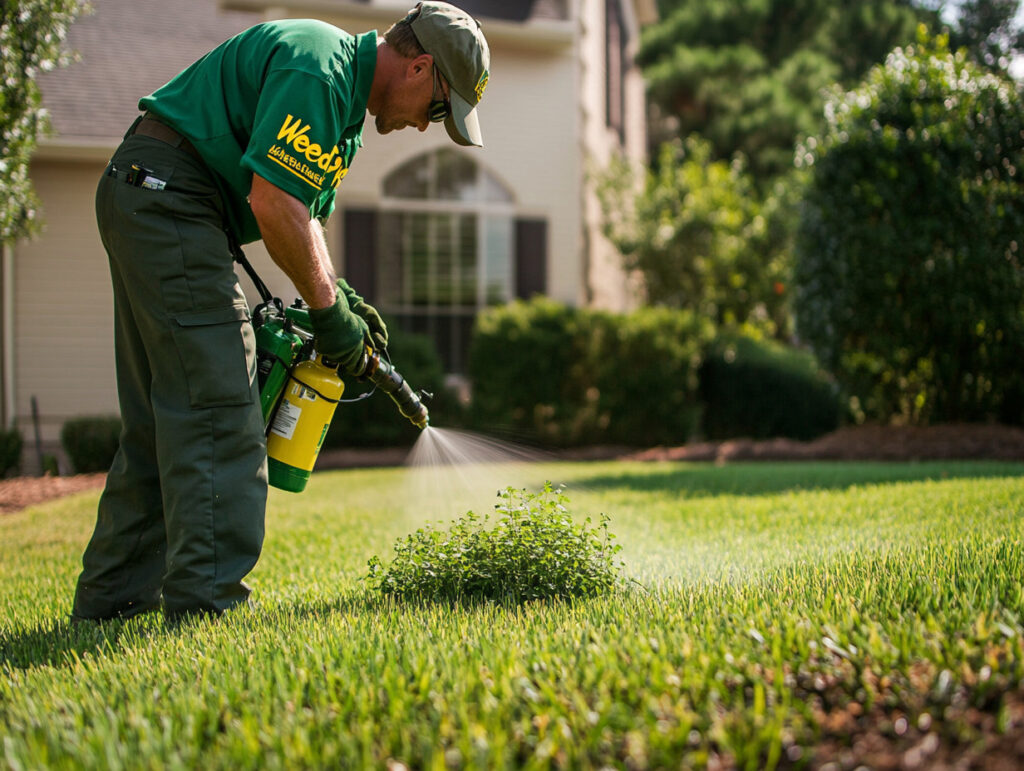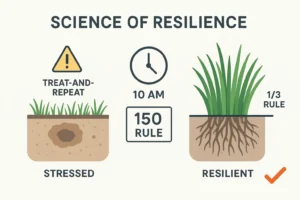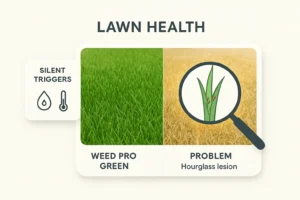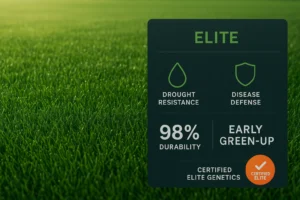Preventing weeds before they emerge is the most effective way to keep your lawn in Atlanta, Georgia, at its best. Pre-emergent lawn care products prevent common, unwanted invaders, such as crabgrass (Poa annua), chickweed, and henbit, from growing in your Bermuda, Zoysia, or tall fescue. Ideally, that leaves your turf able to thrive, healthy, and thick, as seedlings do not suck nutrients away from your established grass. This guide explains pre-emergent herbicides, when to apply them based on local soil temperatures, and the best herbicide for your specific grass type.
How Do Pre-Emergents Create a Barrier that Stops Weeds Before They Can Emerge?
Lastly, pre-emergents will form a fine, uninterrupted line of herbicide in the top ⅛–¼ inch of uncompacted soil, where many weeds will take a stronghold. The line will impede the enzyme activity for cellular division, which stops seeds from establishing roots or shoots. By stopping germination at the plant cellular level, pre-emergent products can prevent up to 90% of weed problems throughout the year before they break the surface.
What Common Weeds Are Manageable With Pre-Emergent Products in Atlanta?
Typical Atlanta home lawn weeds tend to occur in two weed cycles each year:
- Crabgrass and goosegrass occur in the spring.
- Poa annua, chickweed, and henbit will be present in the fall.
Why Is it Better to Control Weeds Before They Start to Grow?
Stopping weeds before they start will keep your turf thicker with a stronger root system, resulting in less frequent and less aggressive spraying, as well as lower herbicide application rates. Prevention helps your turf minimize stress, maintain a uniform color, and ultimately costs less in labor and chemicals than if you try to catch up with post-emergent treatments.
When Should You Apply Pre-Emergent Products in Atlanta for the Best Results?
Getting the timing just right for pre-emergent applications is crucial for Atlanta lawns. Applying too early or too late can leave openings for weeds to sneak in or even harm your emerging turf.
| Season | Weeds Targeted | Soil Temp Range | Ideal Application Window |
|---|---|---|---|
| Early Spring | Crabgrass, Goosegrass | Consistently around 55°F | Late February – Mid-March |
| Late Summer | Poa Annua, Chickweed, Henbit | Below 70°F | Mid-August – Mid-September |
What Are the Ideal Soil Temperatures for Spring and Fall Pre-Emergent Treatments?
For early spring applications, the best time to apply is when the backyard thermometer consistently reads 55°F, indicating that the germination of crabgrass and numerous annual weeds is on the verge of beginning. In late summer and fall, you will want to apply when the soil temperatures drop below 70°F, as Poa annua and several other winter annual weeds are about to germinate with the cooling temperatures.
How does Atlanta’s weather affect when I should apply pre-emergents?
Atlanta has mild winters and hot and humid summers that can compress weed germination cycles, often narrowing the spring application window before weed germination begins to just a few weeks. Heavy summer rains may delay fall applications until the soil moisture is reduced enough for manageable applications. Therefore, it is necessary to monitor local weather and soil conditions to apply pre-emergent treatments accordingly.
When should I apply pre-emergent on my lawn in Atlanta?
For any established lawn, two applications are usually sufficient throughout the year.
- Spring: Late February-March (when consistent soil temperature is 55°F)
- Fall: Mid-August until Mid-September
This will ensure that seasonal and annual pre-emergent applications continue to protect against common summer and winter weeds in the city.
Which Pre-Emergent Products Work Best for Atlanta’s Grass Types?
Selecting the right active ingredient and formulation is key to getting great coverage and keeping your Bermuda, Zoysia, and tall fescue lawns in Atlanta healthy and safe.
| Grass Type | Recommended Pre-Emergent | Key Points |
|---|---|---|
| Bermuda Grass | Prodiamine (Granular) | Forms a strong barrier, provides long-lasting control |
| Zoysia Grass | Dithiopyr (Liquid) | Offers flexible timing, has some early post-emergent action |
Tough granular products offer extended protection in high-traffic areas, while liquid formulas are quick to incorporate into the soil and versatile for smaller lawns.
How Do Ingredients Like Prodiamine and Dithiopyr Differ for Atlanta Lawns?
Prodiamine does a great job of creating a tough, long-lasting barrier ideal for hardy, warm-season grasses like Bermuda. Dithiopyr has a slightly reduced control time, but it can also stop very young seedlings shortly after they sprout. Liquid dithiopyr is also easier to distribute evenly on slopes or uneven turf areas.
What Are the Recommendations for Application and What Formulations Work Best for Your Atlanta Turf?
Granular sprays are the most economical method of control for a large turf area, and a rotary spreader is instrumental in achieving even coverage. Liquid concentrates can be sprayed as a fine mist from a hose-end or backpack sprayer, and they will usually penetrate soil evenly, especially in tight areas and bed casings.
What Should Your Pre-Emergent Application Decision Be by Atlanta Turf Type?
Pre-emergent choices that work well for warm-season grass like Bermuda and Zoysia are a long-lasting “granular” prodiamine in the spring. Transitional cool-season fescues often perform best when using a liquid prodiamine or a liquid dithiopyr application in the fall, given their slower growth in the spring.
What Are the Key Benefits of Professional Pre-Emergent Lawn Care in Atlanta?
By allowing a professional to apply your pre-emergents, you utilize accurate timing, expert product knowledge, and calibrated equipment to maximize weed control while ensuring the safety of your turf. Our certified technicians continuously check soil temperatures, adjust the application to local conditions, and apply control with uniform application. The results are a thicker, healthier lawn while utilizing fewer chemicals.
- Technicians calibrated the spreaders and sprayers to apply a perfectly even barrier.
- Then they create a customized treatment plan that takes into account your lawn’s unique microclimate and grass type.
- Finally, they have annual service agreements to guarantee that they stay on top of the application plan and revisit your property.
Using a professional pre-emergent service can increase the effectiveness of your weed control by up to 20% over a traditional DIY application. You have the peace of mind that a professional is applying the treatment.
How Does Professional Timing and Product Selection Result in Better Weed Control?
We monitor local soil temperatures and weather patterns to ensure that every treatment is timed appropriately, right when weed seeds are about to germinate, thereby eliminating gaps in treatment. We can also customize the active ingredients we apply to address specific weed threats, ensuring that we preserve the product’s effectiveness while considering the safety of your turf.
What are the financial benefits of professional services for homeowners in Atlanta?
When you turn your pre-emergent treatments over to professionals, you eliminate the labor and reduce the risk of product waste due to overapplication or missing the optimal application time. Over time, you will become more efficient in applying this product, seeing weed counts decrease to the point where you only treat the occasional spot, and spend less on post-emergent chemicals. As a result, you will generally have a prettier lawn, which makes the professional plans worth it.
How Long Does Pre-Emergent Protection Last At Atlanta Lawns?
Most pre-emergent products, when applied by a seasoned technician, can protect for 10-16 weeks. While heavy rain and frequent watering can remove some of the product sooner than a 10-16 week interval, mid-season touch-ups can still effectively perform the protection method as well.
Is Pre-Emergent Safe For All Types Of Lawns and Pets In Atlanta?
Most modern-day pre-emergent herbicides pose little to no risk to established turf if used according to the label directions. Moreover, they break down before there can be a risk to your pets as well. When applying the product yourself, simply refer to the length of time specified in the package instructions for the period you need to remain off the lawn. Also, remember not to apply it over the exposed root zone of any new plants or shrubs, as they require more time to establish compared to other plant life.
Prevent Weeds Before They Emerge
A beautiful lawn starts with prevention. At Weed Pro, we time pre-emergent treatments to Atlanta’s climate, stopping weeds before they sprout. This saves you hours of maintenance and helps your grass stay dense and healthy throughout the year. Don’t wait for weeds to take over—our proactive approach ensures your turf stays lush and green without the need for constant spot treatments.
👉 Contact us today to schedule your pre-emergent treatment before the season starts.
❓ FAQ
Do pre-emergent treatments harm grass seed?
They can if applied right before seeding. Always plan seeding separately from pre-emergent applications.
Can pre-emergents stop crabgrass?
Yes—timed correctly, they’re one of the most effective ways to prevent crabgrass germination.
How often should pre-emergents be applied?
Most lawns benefit from two applications per year—spring and fall.
🔗 Up Next: From Pre-Emergent to Pro Savings: What’s Next for Your Lawn?
Don’t miss: “Weed Prevention vs. Traditional Tactics: The Smart Way to a Lush Atlanta Lawn“







